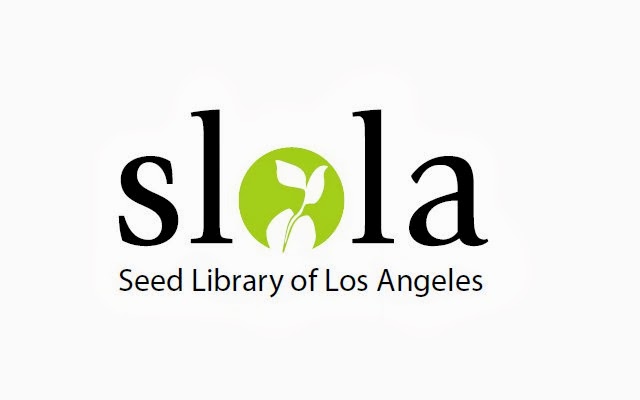MINUTES OF THE FIFTH GENERAL MEETING OF SLOLA
SEED LIBRARY OF LOS ANGELES
APRIL 17, 2011
Executive/Board members in attendance: David King (Chair); Lucinda Zimmerman (Co-Vice Chair); Sarah Spitz (Secretary)
Absent: Ledette Gambini (Treasurer); Clara Yoshihara (Co-Vice Chair)
Committee Chairs present: Linda Preuss (Database); Albert Chang (Best Practices); Lucinda Zimmerman (Organization)
Absent: Elizabeth Bowman (Web/Outreach); Cheryl Noda (membership)
David King called the meeting to order and announced that seeds are now available for check-out. He also gave a brief description of the concept of a seed library and clarified that SLOLA is dedicated to open-pollinated seeds. Membership in SLOLA is $10 for a lifetime.
Reports
Secretary: Sarah Spitz provided minutes from the March 13 meeting.
Treasurer: David, on behalf of Ledette, reported. The treasurer’s report will be submitted as part of these minutes. This is the information contained in that report:
Beginning balance, 2/28/11: $773.37
Income
Memberships: $80.00
Expenses
E. Bowman/web host, 3 years: ($132.00)
Paypal fees: ($1.56)
Ending Balance, 4/15/11: $719.81
Database: Linda, Chair, reported. Database is moving along. Membership and seed inventory are now in an online database (until a permanent database is set up). Sarah has been noting names of people who paid for membership but are not included in the member roster.
Membership: David, on behalf of Cheryl, reported. Eight new memberships in the last month, for a total of 74.
Web & Outreach: Sarah, on behalf of Elizabeth, reported. We are going with Fat Cow for web hosting. We are now transferring from Go Daddy, but we’re stalled until Sarah LaVoie returns from Europe. Jesse Hill wrote up a framework for the individual pages, which now have to be fleshed out. A volunteer, Zach Mann, is designing the site pro bono.
Best Practices: Albert, Chair, reported. Summer seed inventory would be laid out in the shadehouse and orders would be filled after the meeting. Extra plants grown from SLOLA seeds should be brought to the Learning Garden for others to use.
David noted that all meeting minutes and committee reports will be posted to the SLOLA blog: slola.blogspot.org.
Mission Statement
David read the draft mission statement with several changes made by the Executive Committee before the meeting:
“Our mission is to facilitate the growth of open-pollinated seeds among all residents of the Greater Los Angeles Area. We are building a seed collection and repository, educating members about the practice of seed-saving, and creating a local community of seed-saving gardeners. We seek to preserve genetic diversity, increase food security and food justice in our region, safeguard alternatives to GMO’s, and empower all members through a deeper connection with nature and the experience of self-reliance. We strive for excellence in all that we do, knowing the preservation of seed is a sacred trust.”
Albert moved to approve the mission statement; Julie Mann seconded. The mission statement was approved.
Best Practices Presentation
David explained that each meeting will feature a 15-minute presentation by a member of the Best Practices Committee on the topic of a particular type of seed.
In this meeting, Megan Bomba presented cucurbits. She explained that most summer veggies have perfect flowers, which contain both male and female parts, but not cucurbits, which have separate male and female flowers on the same plant. They are often pollinated by bees.
The cucurbitaceae family includes:
- Cucurbita (squashes): maxima, moschata, mixta, pepo
- Cucumis (cucumbers, melons)
- Citrullus (watermelons)
If you’re growing for seed, you need to be careful not to select multiple varieties from the same species because they could cross. (This could also happen if your neighbors are growing different varieties.) To prevent cross-pollinating, many people hand-pollinate cucurbits.
On cucurbits, male flowers are usually the first to appear. When they are about to open, tape them shut. Do the same with the females when they are about to open. The following morning, remove the tape (and remove the petals from the males to expose the anthers, but keep the petals on the females because you will have to tape them shut again). Dab the pollen on the stigmas, close the petals, tape the flowers shut, and leave them taped until they fall off. Carefully mark the plants with wist-ties under the flowers you hand-pollinated so you know which seeds to save. You will know if your hand-pollination was successful because it will produce fruit.
Melons and summer squashes need to be aged (beyond edibility) until their skins harden before their seeds can be removed for saving. Test by trying to indent the skin with your fingernail -- when it is ready, it won’t give.
Seeds from winter squashes are ready to be removed when the fruit is edible. Break open the fruit, scoop out the seeds and rinse them lightly; then dry.
Cucumber seeds should be prepared for saving the way tomato seeds are -- by leaving them in their goop until it forms a scum layer, usually a few days. (leave them outdoors because they will stink) Then wash, dry, and save.
Next Meeting
Sunday, May 15, 2011, at 2:30 pm, at the Learning Garden.
Minutes Submitted by Tim Smith, sitting in for Secretary Sarah Spitz

No comments:
Post a Comment